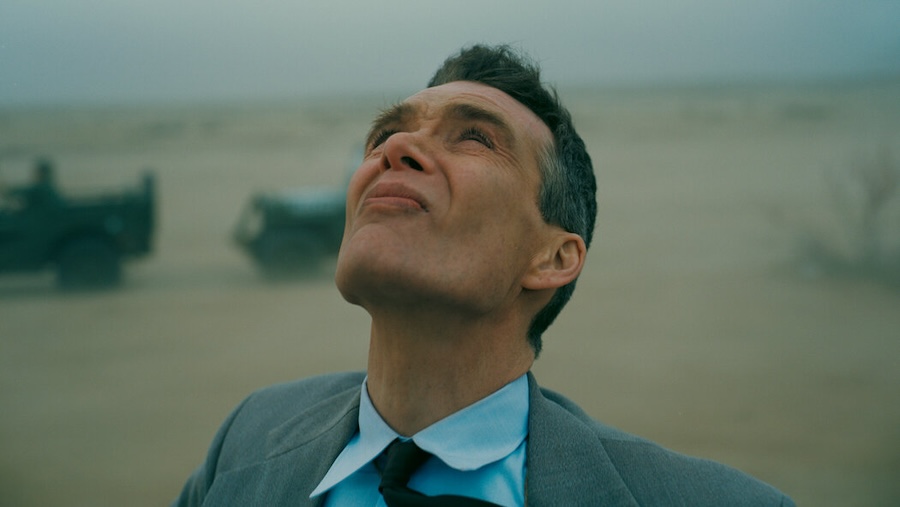
THE WORLD FOREVER CHANGES.

There’s a sex scene in this film that generated negative buzz, where Oppenheimer’s girlfriend tells him to read a Sanskrit passage aloud while she’s riding him. This is where he finds the quote ”Now I am become Death, the destroyer of worlds”, which has famously been connected to him. I was amused by the scene, others found it ridiculous. And then there were the ones who took it much too far, including Hindu nationalists who claimed this was an insult to their faith.
Religious extremists will always find reason to stir up trouble whenever their rigid beliefs clash with freedom of speech and human rights. In a way, that controversy was in line with the message of the film.
Struggling with mental issues
When we’re introduced to J. Robert Oppenheimer (Cillian Murphy), he’s a twentysomething studying physics in Britain and subsequently Germany. In both places, he meets prominent physicians, flirts with Communism and struggles with mental issues. Back in the States, he starts teaching at the University of California and meets two women who will be among the most important in his life, the biologist Katherine Puening (Emily Blunt) and the physicist and Communist activist Jean Tatlock (Florence Pugh).
During World War II, Oppenheimer is recruited by the Army to lead the Manhattan Project, the group of brilliant scientists who will build the atomic bomb. The danger of Communist infiltration emerges as a constant threat against Oppenheimer…
Visualizing a scientist’s angst
When we’re introduced to J. Robert Oppenheimer (Cillian Murphy), he’s a twentysomething studying physics in Britain and subsequently Germany. In both places, he meets prominent physicians, flirts with Communism and struggles with mental issues. Back in the States, he starts teaching at the University of California and meets two women who will be among the most important in his life, the biologist Katherine Puening (Emily Blunt) and the physicist and Communist activist Jean Tatlock (Florence Pugh). During World War II, Oppenheimer is recruited by the Army to lead the Manhattan Project, the group of brilliant scientists who will build the atomic bomb. The danger of Communist infiltration emerges as a constant threat against Oppenheimer…
If you’re building a bomb that unleashes forces so powerful that they will have your team of scientists fearing they might actually destroy the whole planet in one explosion, then that is likely to have an effect on you. If you’re building a bomb so awesome it actually ends a world war by obliterating two cities and the people who live there, then that is likely to haunt you and make you question the value of what you have created. We know that this happened to Oppenheimer and Christopher Nolan expertly visualizes the scientist’s angst in the film’s second half. Oppenheimer goes to great lengths to show us how certain men of that era failed to discuss what mattered and instead focused on less relevant and sometimes even imaginary threats, much like the religious fundamentalists I mentioned above. Using an intricate framing device in the shape of a Senate confirmation hearing where Lewis Strauss (Robert Downey, Jr.) faces questions as the incoming Commerce Secretary, Nolan depicts him as a small-minded, envious villain who destroys Oppenheimer’s life all because of a bruised ego. The foolishness surrounding our tortured Prometheus is painful to see.
It’s a long movie that gets off to a slow-ish start, but soon becomes increasingly compelling, tracking human flaws alongside scientific progress. It all leads up to the moment when the atomic bomb is tested for the first time in the desert, a sequence where Nolan unleashes the full, explosive potential of all the magicians working for him, including sound technicians, cinematographer Hoyte Van Hoytema (who uses closeups to great effect) and composer Ludwig Göransson (who delivers a propulsive score).
Cillian Murphy capably leads a star-studded cast, where Robert Downey, Jr. stands out as the slick, spiteful Strauss.
As you read up on the merits of Kitty Oppenheimer, it is clear that Nolan has failed to give her the kind of rich portrait she deserved, but Blunt still crafts an arresting performance, especially as her character gains importance in the second half. Murphy capably leads a star-studded cast, where Downey, Jr. stands out as the slick, spiteful Strauss. In many ways, this is a traditional biopic, but Nolan’s immersive filmmaking skills make it a haunting experience.
Oppenheimer 2023-U.S.-U.K. 180 min. Color-B/W. Written and directed by Christopher Nolan. Book: Kai Bird, Martin J. Sherwin (”American Prometheus”). Cinematography: Hoyte Van Hoytema. Music: Ludwig Göransson. Editing: Jennifer Lame. Cast: Cillian Murphy (J. Robert Oppenheimer), Emily Blunt (Katherine ”Kitty” Oppenheimer), Matt Damon (Leslie Groves), Robert Downey, Jr. (Lewis Strauss), Florence Pugh, Josh Hartnett, Casey Affleck, Rami Malek, Matthew Modine, Jack Quaid, Kenneth Branagh, Benny Safdie, Dane DeHaan, Jason Clarke, Tom Conti, Alden Ehrenreich, Gustaf Skarsgård, Gary Oldman, James Remar.
Trivia: Co-produced by Nolan; co-executive produced by James Woods. Oppenheimer was also depicted in a 1980 miniseries, the TV series Manhattan (2014-2015) and the feature film Fat Man and Little Boy (1989).
Oscars: Best Picture, Directing, Actor (Murphy), Supporting Actor (Downey, Jr.), Cinematography, Original Score, Film Editing. Golden Globes: Best Motion Picture (Drama), Director, Actor (Murphy), Supporting Actor (Downey, Jr.), Original Score. BAFTA: Best Film, Director, Actor (Murphy), Supporting Actor (Downey, Jr.), Cinematography, Editing, Original Score.
Last word: “Tenet deals with a science-fiction extrapolation of that notion: Can you put the toothpaste back in the tube? The danger of knowledge, once knowledge is unveiled – once it’s known, once it’s fact – you can’t wind the clock back and put that away. So having dealt with that, in a science-fiction sense, at the end of that film, I was sort of left with that as a hanging question. And actually, Robert Pattinson, who’s in Tenet, as a wrap gift, he gave me a book of Oppenheimer speeches, post-World War II speeches. And reading those and reading about the great minds of that time, in the early ‘50s, trying to wrestle with and create some kind of intellectual framework by which to understand and deal with a new existential threat, the first ever truly existential threat to life on Earth – it’s a frightening time to read about, when it’s so new.” (Nolan, Bulletin of the Atomic Scientists)
